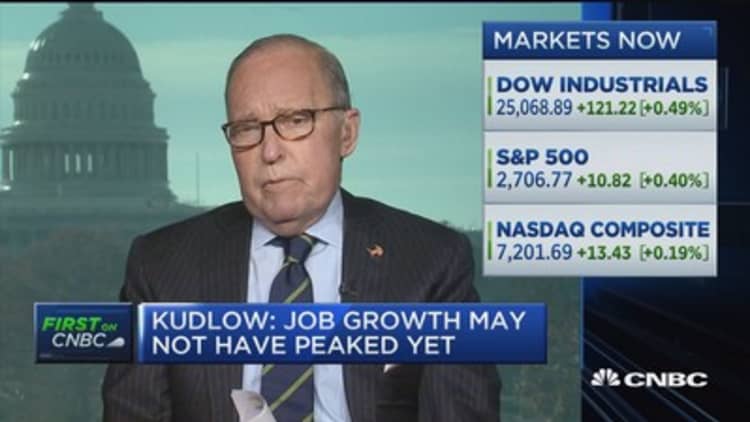Larry Kudlow, President Trump's economic adviser, suggested on Friday that China was stealing intellectual property and trade secrets from Apple, which may be contributing to the iPhone maker's financial challenges in the country.
However, he hedged a bit: "I don't want to surmise too much here, but Apple technology may have been picked off by China and now China is becoming very competitive with Apple," Kudlow said.
That was diplomatic of him. Because China is clearly taking Apple's IP and trade secrets and that fact is most certainly damaging the company's business.
This isn't a new problem, and companies know that, to some degree, it's the price of doing business in the world's second-biggest economy. Apple is at particular risk because of its large exposure to China and because of the country's increasingly sophisticated manufacturing sector. Last year, China's Huawei surpassed Apple in shipments of smartphones.
U.S. intelligence agencies and the Justice Department have laid out a long list of the types of concerted hacking and spying campaigns used by China to steal the IP of U.S. tech companies. China and its companies have strongly denied most of these claims over the years, making it hard for U.S. companies to take action. For example, a former Apple engineer was arrested in 2018 and charged with stealing self-driving car secrets. The engineer has denied the claims and pleaded not guilty in a California court.
'No enforcement'
Kudlow added just a bit of insight to his assessment on Friday, saying that "there are some indications from China that they're looking at that, but we don't know that yet. There's no enforcement. there's nothing concrete."
Apple didn't provide a comment for this story.
But it's not just the alleged, illegal "theft" of IP that companies are worried about. China has plenty of tools to legally gain access to intellectual property.
In 2016, the government enacted a new cybersecurity law that provided a clearer view into the IP-for-access transactional nature of doing business on the mainland. In the first version of that law, companies were required to provide the government with source code or other valuable encryption information supposedly to ensure that the code is secure, according to the statute. Source code is the computer code that makes up the backbone of a company's operating system, its applications or other programs.
While there have been some changes to the 2016 law, experts routinely warn companies that Chinese regulators have a significant degree of control over what type of private information they can demand, even beyond source code or encryption.
Apple, Microsoft and Google all expressed significant concerns with the law at the time, but they have little recourse. China began implementing it in 2017, and companies have for the most part shown they're willingness to comply.
One aspect of the law requires companies with data in the cloud to partner with Chinese-owned service providers to store that information. That's raised concern that cloud services provide another way for China to ensure easy access to both the data of its citizens and the IP of foreign companies. Nevertheless, in July 2017, Apple said it was transferring its data in China to a company called Guizhou-Cloud Big Data.
iPhones aren't Nikes
U.S. lawmakers have good reason to be more vocal about tech companies' plans for China than they are when it comes to consumer goods brands like Nike.
For one, they don't want American tech companies to have the appearance of supporting a government that uses technology to oppress its citizens. You may have noticed how government officials have criticized Google over the Dragonfly internet search engine project the company has explored with the Chinese government.
China employs 200 million surveillance cameras and facial recognition software to track its population, has a strict social credit system and has jailed unknown numbers of dissidents for expressing their opinions online.
But perhaps the bigger concern is that if China is allowed to access the source code and encryption information from U.S. companies, the Chinese government could use that data to tap into U.S. government agencies, banks and other facilities that also use that same technology.
The Trump administration has been vague on details, but it may well realize that this trade-off is bad for the American economy even if Apple and other companies have to sacrifice some of their growth.



